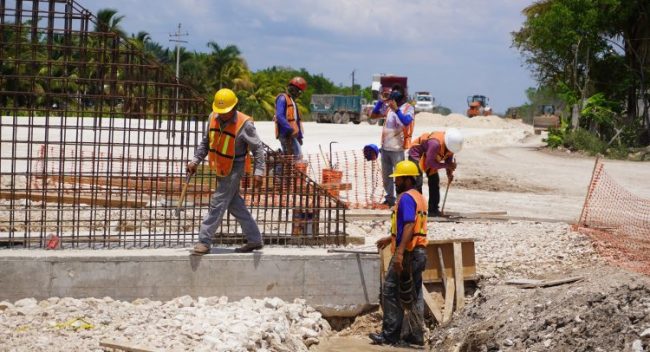Governor Mauricio Vila Dosal held a meeting with the director of the National Fund for the Promotion of Tourism (Fonatur), Javier May Rodríguez. The union of Yucatecan workers seeks greater participation in the works of the Mayan Train and offer better conditions to the local workforce.
The Union of Transport, Construction, Communication, Maintenance, and Services System Workers (Sitracom), headed by Antonio Gamboa García, is not giving up and will seek that with the new head of the National Fund for the Promotion of Tourism (Fonatur), Javier May Rodríguez so that the Yucatecan builders have more presence in the Mayan Train project since with foreign and national companies they have only been left with leftovers.
“We have 20% of the project, it is very little, since it is by subcontracting and for them to give us more, it is without advance payment and without a contract and that is a lot of risks, even with a contract, sometimes they do not respond to you and we prefer not to enter it with those conditions. ”, he indicated.
He mentioned that they had a brief meeting with the current head of Fonatur, “at least we saw interest”, who would attend them later since he has to review the documentation and prepare a tour of President Andrés Manuel López Obrador; “With the previous one (by Rogelio Jiménez Pons) we spoke very little”.
He recognized that it is not too late for them to achieve more inclusion since, for now, the work is officially delayed by 6 months, but by more than a year. “With 24-hour jobs, backlogs can be cut.”
As is known, in one of his morning conferences, President Andrés Manuel López Obrador indicated that the construction companies of the first four sections and the 5 south are committed to completing the works in the required time, but a greater advance will be suggested.
The Federal Government also wants more physical and financial advancement. There are companies that must invoice up to one billion pesos per month and they are not advancing in the same way.
The firms he referred to are Mota-Engil, Carso, INDI, ICA, and Grupo (in section 5 south).
According to the columnist Lourdes Mendoza del Financiero, she made a comparison of what they had estimated, what has been advanced, and what is behind. In the Palenque – Escárcega section, an advance of 77.7% was programmed and the real one is 19.7%, which has a delay of 58%.
To avoid repetitions for programmed advance it will be abbreviated (AP), for the real one (AR), and delay (A).
From Escárcega-Calkiní it is 82.6% (AP), 9.8% (AR) and 72.8% (A). For the Calkiní-Izamal section it has 68.1% (AP), 13.3% (AR) and 54.8% (A).
For the section from Izamal to Cancun it has 67.5% (AP), 20.1% (AR), and a delay of 47.4% and finally, for Playa del Carmen north to Tulum north it is 20.6%, 0.5%, and 20.1%, the AP, AR, and A figures, respectively.
Asked if the delays have been due to the protections that the community members and Ejidatarios have made, since they see irregularities for the sale of their land, she indicated that land ownership is very diverse, sometimes she feels that they are paid very little. and they want more, “there is also no shortage of groups that sometimes take bad advice and only cause delays.”
He said that the President wanted to buy the land in an appropriate manner, but in this situation, he will resort to legal means, since it is for work that will bring benefit to the region.
ALMOST OUT OF THE PLAY
Antonio Gamboa pointed out that in other states, where the express will also pass, it has been denounced that “Moches” (Bribes), have been requested, something that is condemned in the 4T, but he clarified that they have not been asked and they would not give it either, to that they get contracts, “I think that’s the reason why sometimes we don’t qualify because we like to work the right way.”
About the lack of representation that they have had in the works and that goes against the speech made by the President, about that national or local builders will be supported and that it has turned out to be a lie, he said that they as builders have only managed to have like a 20%, but foreign companies have hired Mayan people in trades such as carpenters and masons.
“Although there is the case of the Chinese Mota Inn, which is in the Escárcega stretch, it employed about 500 Chinese as well as its engineers and all its trusted personnel,” he said.
For his part, the state delegate of the Mexican Association of the Construction Industry, Jorge Alberto Villalobos Herrera, indicated that there have been massive layoffs and that this is due to the fact that they are hired on an occasional basis and when a construction stage ends, dismisses them.
He said that in his case the construction companies that are affiliated with his association have to be socially responsible.
“It is estimated that, in the Mayan Train, 40% of the workforce is Yucatecan and the rest is foreigners who rented a house,” he said.
As is known, the megaproject would cover approximately 1,500 kilometers in the southeast of the country, crossing Campeche, Chiapas, Tabasco, Yucatán, and Quintana Roo.
So far, it has changed its lines seven times, due to the fact that archaeological remains were found, the ground conditions were not conducive to the passage of the expressway and homes.
In Mérida, everything indicates that it will pass through Teya, that is, very close to the Periférico of the Yucatecan capital.
Villalobos Herrera pointed out that in Mérida they have not started working, they do not know their route, “the construction company that has that section could have the answer.”
TYT Newsroom



